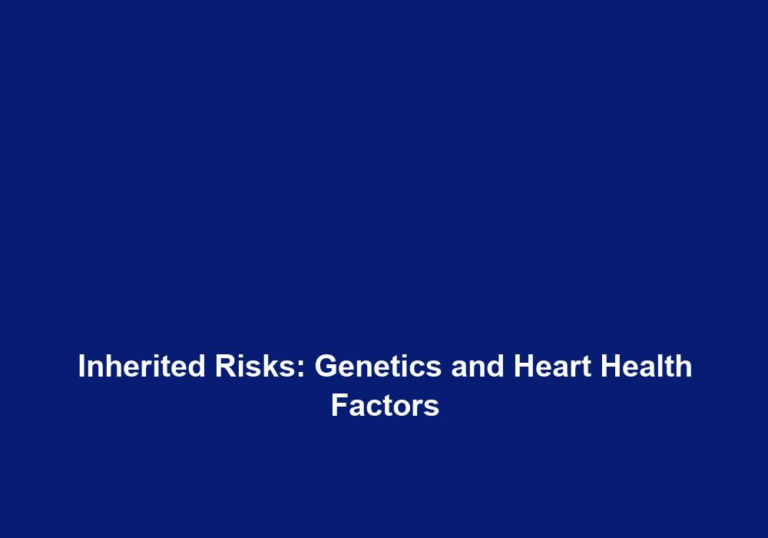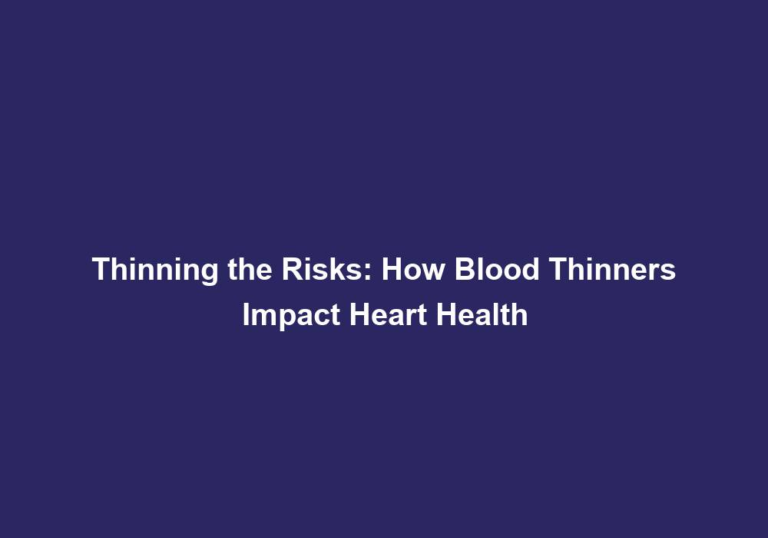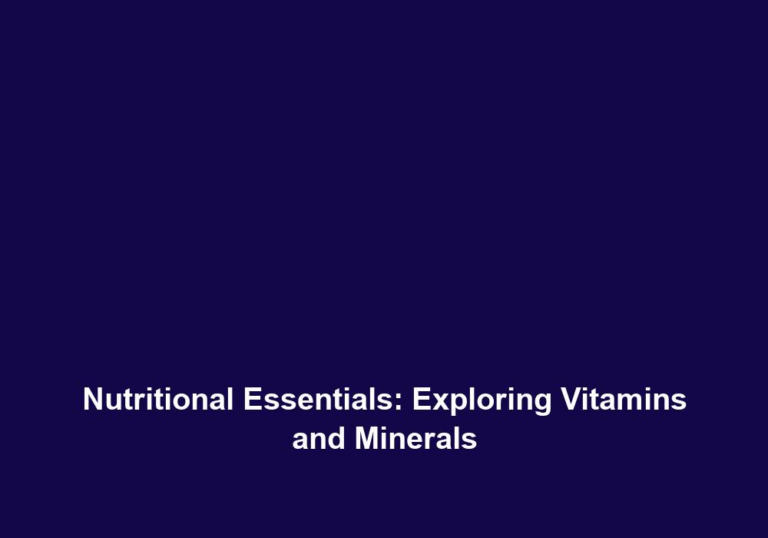Unlocking the Keys to Heart Health: Identifying Risk Factors
Heart disease continues to be a leading cause of death worldwide. It is crucial to understand and identify the risk factors associated with heart health to prevent and manage cardiovascular issues effectively. By recognizing these risk factors, individuals can make informed decisions about their lifestyle choices and take necessary actions to improve their heart health. In this article, we will explore the key risk factors for heart disease and discuss ways to mitigate their impact.
Importance of Identifying Risk Factors
Identifying risk factors for heart disease is essential in assessing an individual’s susceptibility to developing cardiovascular issues. By recognizing these factors, healthcare professionals, individuals, and communities can take proactive steps to prevent heart disease and promote heart-healthy lifestyles. Understanding the risk factors also helps in early detection and timely intervention, leading to better management and improved outcomes.
Early Detection and Timely Intervention
One of the significant benefits of identifying risk factors for heart disease is the opportunity for early detection and timely intervention. When individuals are aware of their risk factors, they can be more proactive in seeking regular medical check-ups and screenings. Early detection of cardiovascular issues allows for prompt intervention, which can significantly improve outcomes and prevent the progression of heart disease. Healthcare professionals can provide appropriate treatment plans and lifestyle recommendations tailored to an individual’s specific risk factors, reducing the impact of heart disease on their overall health.
Prevention and Heart-Healthy Lifestyles
Recognizing risk factors empowers individuals to make proactive choices that promote heart health and prevent the development of cardiovascular issues. By understanding the factors that contribute to heart disease, individuals can take steps to modify their lifestyle behaviors and adopt heart-healthy habits. This can include making dietary changes, incorporating regular physical activity, quitting smoking, limiting alcohol consumption, and maintaining a healthy weight. By addressing modifiable risk factors, individuals can significantly reduce their risk of heart disease and improve their overall cardiovascular health.
Modifiable Risk Factors
- Poor Diet: Unhealthy eating habits, such as consuming excessive amounts of saturated and trans fats, sodium, and added sugars, contribute to the development of heart disease. A diet high in processed foods, sugary beverages, and fast food increases the risk of obesity, high blood pressure, high cholesterol levels, and diabetes. To improve heart health, individuals should focus on consuming a balanced diet rich in fruits, vegetables, whole grains, lean proteins, and healthy fats.
- Incorporate a variety of fruits and vegetables into your diet to ensure an adequate intake of essential vitamins, minerals, and antioxidants.
- Choose whole grains over refined grains to increase fiber intake, which can help lower cholesterol levels and maintain healthy blood pressure.
- Opt for lean proteins such as poultry, fish, beans, and legumes, while limiting the consumption of red meat and processed meats.
- Replace unhealthy fats with healthier alternatives like olive oil, avocados, and nuts to promote heart health.
- Limit the intake of sugary beverages and opt for water, herbal tea, or unsweetened beverages instead.
- Physical Inactivity: Leading a sedentary lifestyle is a significant risk factor for heart disease. Regular physical activity helps maintain a healthy weight, lowers blood pressure, improves cholesterol levels, and reduces the risk of developing chronic conditions like diabetes. Engaging in at least 150 minutes of moderate-intensity aerobic exercise or 75 minutes of vigorous exercise per week is recommended for adults to promote heart health.
- Find activities that you enjoy and make them a regular part of your routine. This could include walking, jogging, swimming, cycling, or participating in fitness classes.
- Incorporate strength training exercises into your routine to build muscle and improve overall cardiovascular fitness.
- Break up prolonged periods of sitting by taking short walks or stretching throughout the day.
- Consider using wearable fitness trackers or smartphone apps to monitor your physical activity levels and set goals for improvement.
- Engage in activities that promote flexibility and balance, such as yoga or tai chi, to enhance overall physical well-being.
- Smoking and Tobacco Use: Smoking and tobacco use have detrimental effects on cardiovascular health. Nicotine and other harmful substances in tobacco products damage the blood vessels, increase blood pressure, decrease oxygen supply, and promote the formation of blood clots. Quitting smoking and avoiding exposure to secondhand smoke significantly reduce the risk of heart disease.
- Seek support from healthcare professionals, counseling services, or smoking cessation programs to quit smoking.
- Find alternative strategies to manage stress or cope with cravings, such as exercise, relaxation techniques, or hobbies.
- Create a smoke-free environment by avoiding places where smoking is permitted and asking family and friends not to smoke around you.
- Stay motivated by reminding yourself of the numerous health benefits of quitting smoking, including improved heart health and overall well-being.
- Be aware of the potential challenges and setbacks during the quitting process and develop strategies to overcome them.
- Excessive Alcohol Consumption: Consuming alcohol in excessive amounts can lead to various cardiovascular issues, including high blood pressure, heart failure, and stroke. Limiting alcohol intake to moderate levels – up to one drink per day for women and up to two drinks per day for men – can help promote heart health.
- Understand the definition of moderate alcohol consumption and be mindful of portion sizes.
- Consider non-alcoholic alternatives or mocktails to reduce alcohol consumption while still enjoying social gatherings.
- Pace yourself when drinking alcohol and avoid binge drinking, as it can increase the negative effects on the cardiovascular system.
- Be aware of the potential interactions between alcohol and medications, as certain medications may have adverse effects when combined with alcohol.
- If you have difficulty limiting your alcohol intake, seek support from healthcare professionals or support groups specialized in alcohol addiction.
- Obesity and Overweight: Being overweight or obese significantly increases the risk of heart disease. Excess weight strains the heart, raises blood pressure, increases cholesterol levels, and contributes to the development of diabetes. Adopting a healthy eating plan and engaging in regular physical activity are key strategies for achieving and maintaining a healthy weight, thus reducing the risk of heart-related problems.
- Set realistic and achievable weight loss goals, aiming for a gradual and sustainable approach.
- Consult with a registered dietitian or nutritionist to develop a personalized meal plan that supports weight loss and heart health.
- Practice portion control and mindful eating to prevent overeating and promote healthy weight management.
- Keep a food diary to track your eating habits and identify areas for improvement.
- Incorporate resistance training into your exercise routine to build muscle mass and boost metabolism.
Non-Modifiable Risk Factors
- Age: As individuals age, the risk of heart disease increases. Men over the age of 45 and women over the age of 55 are more susceptible to developing cardiovascular issues. However, it is important to note that heart disease can affect individuals of any age, and lifestyle choices play a crucial role in determining overall heart health.
- Be proactive in monitoring your heart health as you age, even if you do not have any symptoms or risk factors.
- Follow healthcare professionals’ recommendations for regular check-ups, screenings, and preventive measures.
- Stay informed about age-specific risk factors and symptoms of heart disease to seek timely medical attention if needed.
- Embrace healthy lifestyle habits from an early age to reduce the impact of age-related risk factors on heart health.
- Family History: Having a close family member, such as a parent or sibling, with a history of heart disease increases the risk of developing cardiovascular issues. This suggests a possible genetic predisposition. Individuals with a family history of heart disease should be particularly vigilant in adopting heart-healthy habits and seeking regular medical check-ups.
- Educate yourself about your family’s medical history, including any instances of heart disease or related conditions.
- Share this information with your healthcare provider to determine the appropriate screening tests or preventive measures.
- Follow a heart-healthy lifestyle, including a balanced diet, regular physical activity, and stress management techniques.
- Consider genetic testing or counseling services to gain further insights into your risk profile and make informed decisions.
- Gender: Men generally face a higher risk of heart disease compared to pre-menopausal women. However, after menopause, the risk for women increases, and post-menopausal women are just as susceptible to heart disease as men. Hormonal changes, along with other risk factors, contribute to this increased risk.
- Women should be aware of the changing risk factors associated with hormonal changes, especially during menopause.
- Seek regular medical check-ups and screenings to monitor your heart health as you age.
- Communicate openly with healthcare professionals about any concerns or symptoms related to heart disease.
- Embrace heart-healthy habits, including a balanced diet, regular exercise, and stress management, to reduce the impact of risk factors associated with gender.
- Ethnicity: Certain ethnic groups, such as African Americans, Hispanics, and South Asians, have a higher risk of heart disease compared to others. Genetic factors, cultural differences, and disparities in healthcare access and quality contribute to these increased risks. Awareness of these disparities can help tailor interventions and preventive measures accordingly.
- Educate yourself about the specific risk factors and prevalence of heart disease within your ethnic group.
- Advocate for culturally appropriate healthcare services and resources to address disparities in access and quality.
- Engage in community initiatives and support groups that promote heart health within your ethnic community.
- Work with healthcare professionals who understand the unique challenges and risk factors associated with your ethnicity.
- Take proactive steps to adopt heart-healthy habits, including a balanced diet, regular physical activity, and stress management techniques.
Conclusion
Identifying and understanding the risk factors associated with heart disease is vital for maintaining cardiovascular health. By addressing modifiable risk factors such as poor diet, physical inactivity, smoking, excessive alcohol consumption, and obesity, individuals can significantly reduce their risk of heart disease. Additionally, recognizing non-modifiable risk factors such as age, family history, gender, and ethnicity allows individuals to make informed decisions about their lifestyle choices and seek appropriate medical care. It is crucial to promote awareness about these risk factors and implement strategies that empower individuals to take control of their heart health and live a longer, healthier life.
Note: This article is written in Markdown format.







